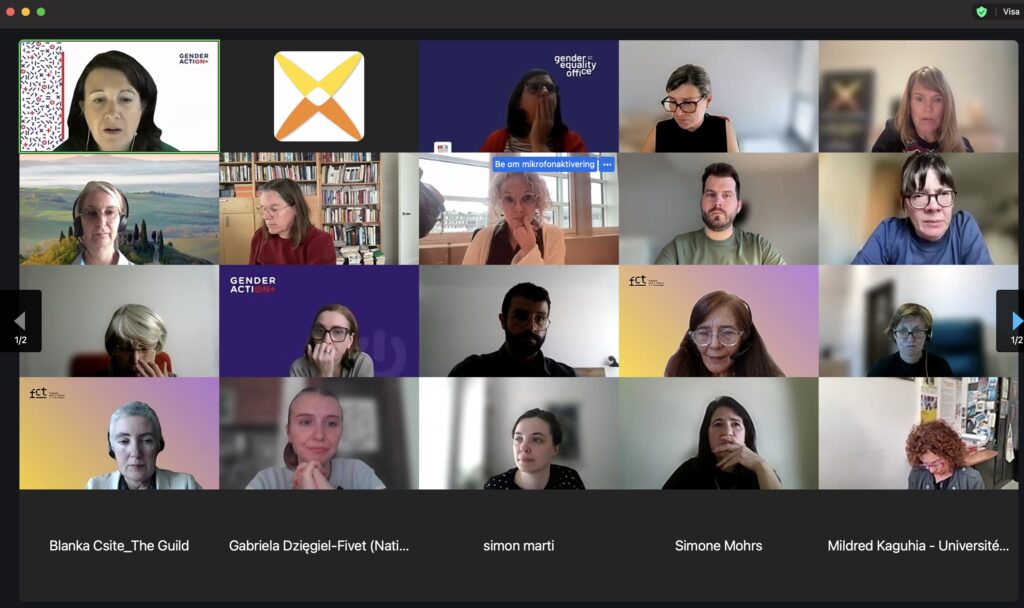Inclusive research careers were the focal point of a GENDERACTIONplus stakeholder engagement event held on Monday 30 September. Thirty-five representatives from European and national organisations within the R&I eco-system actively participated in the online consultation, providing valuable feedback on draft policy recommendations developed by partners within the EU GENDERACTIONplus project. The event was organised and moderated by Public & Science Sweden as part of its stakeholder engagement work in the project.

The policy recommendations ‘Research careers: the ground for gender+ inclusion’ aim to promote a more inclusive approach to research careers across Europe, encouraging systemic changes that embrace diversity, gender equality, and the elimination of structural barriers. The event brought together a wider range of stakeholders addressed by the policy recommendations, including European policy makers, national authorities, research funding organisations (RFOs), research performing organisations (RPOs) and higher education institutions (HEIs).
Setting the stage: a collaborative approach
The event began with an introduction to the GENDERACTIONplus project by Marcela Linková, Project Coordinator and Head of the Centre for Gender and Science at the Czech Academy of Sciences. Luisa Henriques, Co-sponsor of the ERA Policy Agenda Action 4 (Promote attractive research careers, talent circulation and mobility) and Senior Policy Analyst at the Foundation for Science and Technology in Portugal, provided a broader context on the European policy landscape concerning research careers. She particularly highlighted how gender considerations feature in policy instruments such as the European Framework for Research Careers and the European Charter for Researchers.
Draft recommendations: insights and discussions
Maria João Sequeira from the Foundation for Science and Technology in Portugal then guided participants through the development process of the policy recommendations. She highlighted some key findings from a Europe-wide survey and the resulting benchmarking report on Inclusive Research Careers, produced by GENDERACTIONplus, which pinpointed gaps in national and RFO policies that need to be addressed to make research careers more inclusive and sustainable.
Stakeholders then engaged in breakout sessions for in-depth discussions on the recommendations and their potential implementation. Participants praised the recommendations as ”comprehensive” and “holistic,” addressing a wide array of stakeholders. Discussions explored challenges in implementation, highlighting the varying national contexts that could affect the adoption of these recommendations, and stressing the need for tailored approaches. The need for concrete incentives and instruments, similar to the Gender Equality Plan (GEP) requirement, was highlighted to encourage uptake and commitment from national and institutional actors. In addition, discussions also touched on the importance of collecting relevant data to monitor progress and how current data protection laws pose challenges to gathering more detailed demographic information beyond gender. A call was also made for showcasing national and institutional best practices as a way to inspire and guide implementation across different contexts.
Reflecting on the consultation, Maria João Sequeira and Rosário Costa noted, “Stakeholder consultation is always a reality check. Our aim was to gather insights from those involved in promoting gender equality or research careers in their countries and communities, from academics to policymakers. Identifying points for further improvement in the recommendations, confirming their relevance, and adjusting the focus is crucial to achieving a consistent impact on policy.”
Feedback on the event was very positive, with participants expressing their appreciation for the opportunity “to contribute to such an important brief.” Many found the event ”inspiring” and ”very beneficial,” noting that the insights gained would help inform their organisations’ strategies on research careers and gender equality.
Following the event, feedback from the consultation will be carefully reviewed and incorporated into a final version of the recommendations. These will be submitted to the European Commission and made publicly available on the GENDERACTIONplus website in November.
